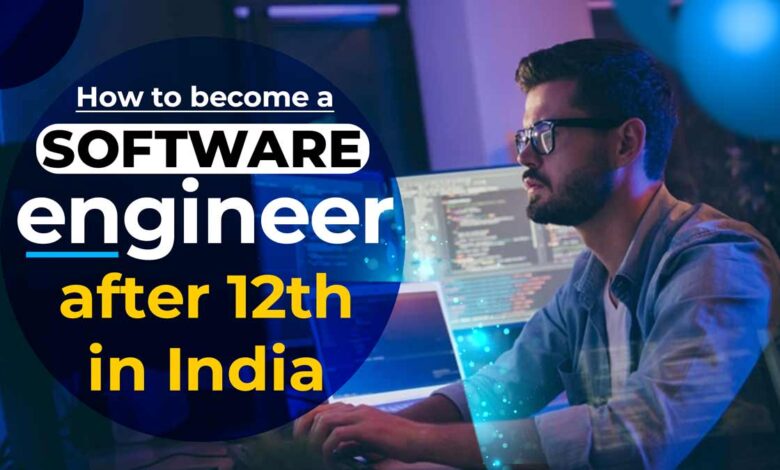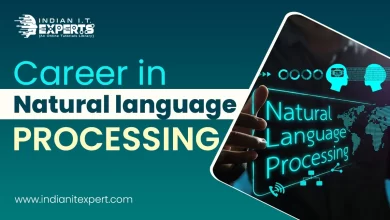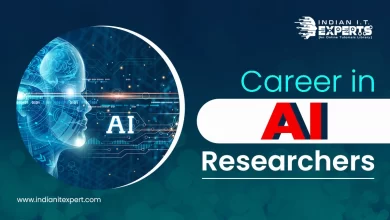How to become a software engineer after 12th in India | How to Become a Software Engineer After 12th?

Get the complete guide about ‘How to become a software engineer after 12th in India step-by-step. Software engineer make programs that help to run a system. They write and test code for computer apps that is perfect and function properly. They mainly write codes for many types of software, and use the program made by software developers and engineers into the right instructions that a computer can follow easily and work properly.
Table of Contents
What are the responsibilities of Software Engineer?
Software engineers are concerned with applying engineering principles to software development. Their responsibilities include analysing and modifying existing software, as well as designing, building, and testing end-user applications to meet user requirements — all using software programming languages.
Requirements for a Software Engineer:
- A bachelor’s degree in computer science, software engineering, or a field related to computer science.
- 5 to 7 years of experience in software engineering or software development, preferably in a related field.
- Programming experience with relevant languages.
- Knowledge of relevant tool suites.
- Excellent written and verbal communication skills, as well as interpersonal skills.
Responsibilities of a Software Engineer:
- Creating and directing methods for software system validation and testing.
- Managing our software development initiatives.
- Managing the documentation development process.
- Communicating project statuses and proposals with clients and cross-functional departments.
- Data analysis to effectively coordinate the installation of new systems or modifications to existing systems.
If you want to become a software engineering then you can do this course after 12th:
1. B. Tech Computer Science:
B. Tech (CSE) is a four-year undergraduate program that focuses on computer programming languages and computer system technologies. The Course is designed to provide candidates with the necessary skills in the areas of computer application, research and development, and computer programming.
Some of the facts related to a B. Tech Computer Science degree are as follows:
- The annual fees for the B Tech Computer Science course range between INR 50,000 and INR 200,000.
- The B Tech Computer Science Admissions process is typically merit-based. However, some colleges hold their own entrance exams.
- The top B Tech entrance exams include JEE, IPU, WBJEE, BITSAT, and others.
- The most common types of B Tech courses pursued by students in India are regular B Tech Computer Science and part-time B Tech Computer Science.
- Typical Jobs Following a B Tech in Computer Science: Computer Engineer, Network Administrator, Application Consultant, System Administrator, Mobile Application Developer, and so on.
Average Salary:
The average annual starting salary for B. Tech Computer Science in India ranges between INR 3 and 15 Lakh.
The table below contains a sectional semester-by-semester syllabus of the B Tech in Computer Science program:
| Semester 1 | Semester 2 |
| Organic and Inorganic Chemistry | Biology |
| Physical Chemistry | Abstractions and Paradigms in Programming |
| Computer Programming and Utilization | Linear Algebra and Ordinary Differential Equations1 |
| Calculus | Workshop Practice |
| Engineering Graphics and Drawing | Electricity and Magnetism |
| Quantum Physics and its applications |
| Semester 3 | Semester 4 |
| Discrete Structures | Digital Logic design |
| Data Structures and Algorithms | Design and Analysis of Algorithms |
| Data Analysis and Interpretation | The logic for Computer Science |
| Introduction to Electrical and Electronic Circuits | Computer Networks |
| Semester 7 & 8 |
| Machine Learning |
| Natural Language Programming |
| Cryptography and Network Security |
| Digital Signal Processing |
| Computer-Aided Geometric Design |
Students who want to enroll in the B Tech Computer Science program must meet the minimum eligibility requirements listed below:
- Passed a recognized board’s Class 12 or any other equivalent examination with a minimum of 45 percent marks.
- Candidates who took Physics, Chemistry, and Mathematics as compulsory subjects in Class 12.
Some of the skills required to pursue a B. Tech in CSE are as follows:
- Analytical skills.
- Problem-solving skills.
- Critical Thinking.
- Creativity
- Good Programming Skills.
- Strong Data Structures and Algorithm skills.
- Basic web development knowledge.
- Basics of Machine Learning.
- Basics of security, vulnerabilities, and cryptography.
- Ability to gain knowledge quickly.
Some of the top CSE colleges in India are as follows:
- IIT Delhi
- IIT Bombay
- IIT Kanpur
- IIT Kharagpur
- IIT Roorkee
Some of the top recruiters of B. Tech Computer Science graduates are as follows:
- Amazon
- Deloitte
- CGI
- Mindtree
- Infosys
- Cognizant
- TCS
- HCL
- Wipro
- Tech Mahindra
- IBM
- Microsoft
- Mphasis
- HP Inc
2. B. Tech:
Bachelor of Technology (BTech) is a professional undergraduate engineering degree program awarded to candidates after four years of study. In India, there are over 4100 B Tech Colleges. B Tech course fees in IITs range from INR 250,000 to INR 4,50,000, while private engineering colleges charge INR 250,000 to INR 5,00,000. A B. Tech graduate’s average annual starting salary ranges from INR 5 lakhs to INR 7 lakhs.
Each B Tech specialization has a unique course curriculum. Examine the syllabus/course curriculum for some of the most popular B. Tech specializations listed below:
| Aeronautical Engineering | Industrial Engineering |
| Aerospace Engineering | Marine Engineering |
| Automobile Engineering | Mechanical Engineering |
| Biomedical Engineering | Mechatronics Engineering |
| Biotechnology Engineering | Metallurgical Engineering |
| Ceramic Engineering | Mining Engineering |
| Chemical Engineering | Petroleum Engineering |
| Civil Engineering | Power Engineering |
| Communications Engineering | Production Engineering |
| Computer Science Engineering | Robotics Engineering |
| Construction Engineering | Structural Engineering |
| Electrical Engineering | Telecommunication Engineering |
| Electronics & Communication Engineering | Textile Engineering |
| Electronics Engineering | Tool Engineering |
| Environmental Engineering | Transportation Engineering |
The eligibility criteria to pursue a B Tech degree are as follows:
- Candidates must have passed the class 12 exam with Physics, Chemistry, and Mathematics as core subjects from a recognized board.
- They must also have earned a minimum of 60% in all of the above subjects combined.
- The majority of admissions are based on a student’s performance in the entrance examination.
The skills required to pursue a B Tech degree are as follows:
- The candidate should have good verbal and written skills.
- The candidate should be familiar with industry standards.
- The candidate should have leadership skills.
- The candidate should have good knowledge of the core subject.
- The candidate should have a good acquaintance with Computers & IT.
Some of the job profiles after a B. Tech degree are as follows:
| Computer Science Engineer | Mining Engineer |
| Mechanical Engineer | Ceramic Engineer |
| Civil Engineer | Production Engineer |
| Automobile Engineer | Robotics Engineer |
| Chemical Engineer | Electronics & Communication Engineer |
| Electrical Engineer | Lecturer/Professor |
| Electronics Engineer | Software Develop |
| Aeronautical Engineer | Product Manager |
| Marine Engineer | Construction Engineer |
| Aerospace Engineer | Telecommunication Engineer |
Some of the top B. Tech Colleges in India with their fee details are given in the table below:
| College Name | Fees (INR) |
| IIT Bombay | 2,28,000 |
| Institute of Chemical Technology | 85,350 |
| K.J. Somaiya College of Engineering | 2,86,000 |
| RV College of Engineering | 3,00,000 |
| Ramaiah Institute of Technology | 66,806 |
| International Institute of Information Technology | 1,64,000 |
| BMS College of Engineering | 2,29,110 |
| IIT Hyderabad | 2,22,995 |
| Hyderabad Institute of Technology and Management | 82,000 |
| Institute of Aeronautical Engineering | 90,000 |
The following are the top recruiters for B Tech graduates:
- TATA Consultancy
- Bain & Company
- Infosys Technologies
- Larson & Toubro
- IBM Global Services
- InfoEdge India Ltd
- Accenture Services
- Honeywell
- HCL Technologies
- Samsung
Check Also:
- 5 Best Jobs in NGO Management
- 5 High Salary Jobs After Advanced Excel Course
- 5 High Salary Jobs After E Accounting and Banking Course
- Best jobs for girls in India | Best jobs for females in India
- Top 5 highest paying private jobs in India (2022 Guide)
3. Bachelor of Computer Applications (BCA):
The Bachelor of Computer Applications (BCA) is a three-year undergraduate degree program that focuses on the fundamentals of computer application and software development. The degree assists students who are interested in a career in computer applications in establishing a solid academic foundation. The average BCA course fee ranges between INR 70,000 and INR 2 lakhs. A BCA graduate’s annual starting salary ranges from INR 2 lakhs to INR 8 lakhs.
Here’s an overview of the syllabus/subjects you’d likely study in a BCA program over the course of six semesters:
| BCA Semester 1 | BCA Semester 2 |
| Hardware Lab (CIA Only) | Case Tools Lab (CIA Only) |
| Creative English | Communicative English |
| Foundational Mathematics | Basic Discrete Mathematics |
| Statistics I For BCA | Operating Systems |
| Digital Computer Fundamentals | Data Structures |
| Introduction To Programming Using C | Data Structures Lab |
| C Programming Lab | Visual Programming Lab |
| PC Software Lab | |
| BCA Semester 3 | BCA Semester 4 |
| Interpersonal Communication | Professional English |
| Introductory Algebra | Financial Management |
| Financial Accounting | Computer Networks |
| Software Engineering | Programming In Java |
| Database Management Systems | Java Programming Lab |
| Object Oriented Programming Using C++ | DBMS Project Lab |
| C++ Lab | Web Technology Lab |
| Oracle Lab | Language Lab (CIA Only) |
| Domain Lab (Cia Only) | |
| BCA Semester 5 | BCA Semester 6 |
| Unix Programming | Design And Analysis of Algorithms |
| OOAD Using UML | Client-Server Computing |
| User Interface Design | Computer Architecture |
| Graphics And Animation | Cloud Computing |
| Python Programming | Multimedia Applications |
| Business Intelligence | Introduction To Soft Computing |
| Unix Lab | Advanced Database Management System |
| Web Designing Project | |
| Graphics And Animation Lab | |
| Python Programming Lab | |
| Business Intelligence Lab |
The eligibility to pursue a BCA degree course are follows:
- Applicants must have completed Class 12 in any stream with English as a subject and received a minimum of 45 to 55 percent in aggregate (the pass percentage might vary from college to college).
- While some colleges/universities admit students based on merit, others admit students based on personal interviews and written exams.
Some of the skills required to pursue a BCA degree are as follows:
- The ideal candidate will have extensive programming experience.
- The candidate should have sound knowledge of Computers and IT.
- The candidate should have the ability to develop applications for practical aspects.
- The candidate should have strong communication skills.
- The candidate should have strong database concepts.
Some of the job profiles that one can bag after completing a BCA degree are as follows:
- System Engineer
- Software Tester
- Junior Programmer
- Web Developer
- System Administrator
- Software Developer
Some of the colleges where the BCA degree course is offered are given in the table below with its fees:
| Colleges Name | Total Fees |
| Loyola College | INR 1.44 L |
| Kristu Jayanti College | INR 2.27 L to 2.42 L |
| Amity University, Noida | INR 6.36 L |
| Women’s Christian College | INR 1.87 L |
| Banasthali Vidyapith | INR 3.09 L |
Some of the leading IT companies recruiting BCA graduates are as follows:
- Wipro
- Infosys
- IBM
- Oracle
4. Diploma in Software Engineering:
A diploma in Software Engineering is a course at the Diploma level in Software Engineering. Students pursuing a Diploma in software engineering will learn the skills required to create user-friendly, cost-effective, and easy-to-maintain software. As part of their studies, students receive a solid foundation in computer programming and system design. The program also includes principles of software development, testing, and maintenance. This course is three years long. The course costs between INR 1 lakh and INR 5 lakh. A person’s starting salary after completing a Diploma in Software Engineering ranges from INR 15,000 to INR 30,000 per month.
The Eligibility Criteria to pursue Diploma in Software Engineering are as follows:
- The students must have completed the 10th grade or its equivalent from a nationally recognized school board.
Some of the skills required to pursue a Diploma in Software Engineering course are as follows:
- The candidate should have good research skills and problem-solving skills.
- The candidate should have the ability to analyze complex technical information.
Diploma in Software Engineering Syllabus:
- Computer Fundamentals
- Office Automation
- MS-Office & Internet
- Programming Practices & Techniques
- Algorithms
- Flowcharts
- Programming with C
- Data Structures
- OOP using C++, HTML
- RDDMS using Oracle
- Linux & Commands
- Core Java or C#
- Adv. Java or ASP. Net
- Optional (choose anyone)
- JEE
- VB.Net
- System Internals & Networking
- Tally
- AutoCAD
Diploma in Software Engineering Job Types:
- Analysis Programmer
- Software Developer
- Mobile App Developer
- Gaming Developer
- Programmer
- Database Developer
- Technical Customer Care Specialist
- Associate Software Engineer
- Teacher/Lecturer
Diploma in Software Engineering Colleges:
- Delhi Degree College – DDC, Faridabad
- Indian Institute of Computer Technology – IICT, Karnataka
- Janardan Rai Nagar Rajasthan Vidyapeeth (Deemed-to-be-University), Udaipur
Conclusion
In the above article, we have learned about 4 Software Engineering courses after 12th and their details. Global demand for software engineers and programmers has increased in recent years.
FAQs regarding Software Engineering:
-
What is the average salary for a software engineering master’s degree holder?
Students with a master’s degree in software engineering can work as software developers, android developers, game developers, or software testers. Based on years of experience and skills, the average salary for such job profiles ranges between INR 4 – 10 lakhs per year.
-
What are my career options after completing a Ph.D. in Software Engineering?
Students with a Ph.D. in Software Engineering can work as teachers, operations research scientists, research associates, or professors in prestigious institutions. A Ph.D. holder can expect to earn INR 5 lakh per year on average.
-
Does it make sense to enroll in Software Engineering Courses?
Software engineering courses are a wise investment in terms of career opportunities. The courses are job-oriented and skill-based. You can work as a Software Engineer, Android Developer, or Software Tester after completing the software engineering courses.
-
What are the criteria for admission to the BVoc Software Engineering course?
To be eligible, candidates must have completed 10+2 or equivalent exams with a minimum of 55 percent marks from a recognized institute. Most institutes hold a common entrance exam to assess candidates’ aptitude and skills.
-
How much does it cost to take online software engineering courses?
A variety of websites and training institutions offer online certification and diploma courses lasting three to six months. These courses can range in price from INR 8,000 to INR 60,000.




